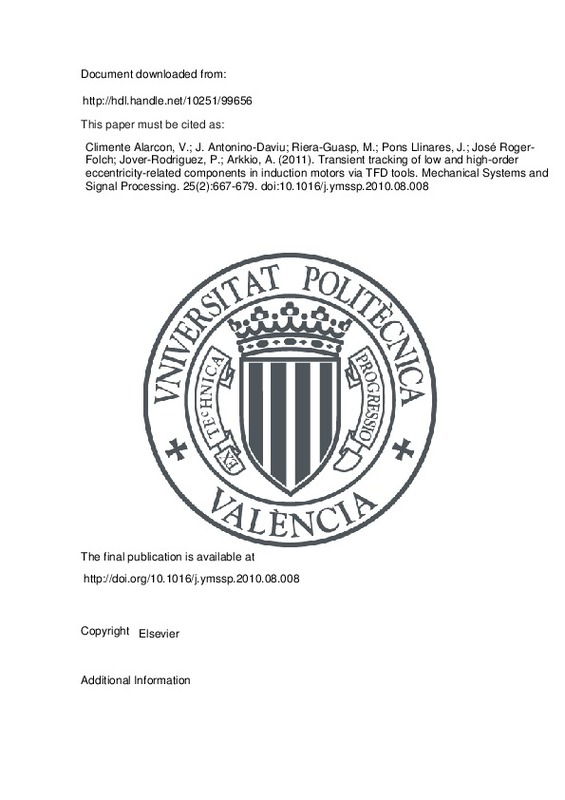Climente Alarcón, V.; Antonino-Daviu, J.; Riera-Guasp, M.; Pons Llinares, J.; Roger-Folch, J.; Jover-Rodriguez, P.; Arkkio, A. (2011). Transient tracking of low and high-order eccentricity-related components in induction motors via TFD tools. Mechanical Systems and Signal Processing. 25(2):667-679. https://doi.org/10.1016/j.ymssp.2010.08.008
Por favor, use este identificador para citar o enlazar este ítem: http://hdl.handle.net/10251/99656
|
Título:
|
Transient tracking of low and high-order eccentricity-related components in induction motors via TFD tools
|
|
Autor:
|
 Climente Alarcón, Vicente
Climente Alarcón, Vicente

 Antonino-Daviu, J.
Antonino-Daviu, J.

 Riera-Guasp, Martín
Riera-Guasp, Martín

 Pons Llinares, Joan
Roger-Folch, José
Jover-Rodriguez, P.
Arkkio, A.
Pons Llinares, Joan
Roger-Folch, José
Jover-Rodriguez, P.
Arkkio, A.
|
|
Entidad UPV:
|
Universitat Politècnica de València. Departamento de Ingeniería Eléctrica - Departament d'Enginyeria Elèctrica
|
|
Fecha difusión:
|
|
|
Resumen:
|
[EN] The present work is focused on the diagnosis of mixed eccentricity faults in induction motors via the study of currents demanded by the machine. Unlike traditional methods, based on the analysis of stationary currents ...[+]
[EN] The present work is focused on the diagnosis of mixed eccentricity faults in induction motors via the study of currents demanded by the machine. Unlike traditional methods, based on the analysis of stationary currents (Motor Current Signature Analysis (MCSA)), this work provides new findings regarding the diagnosis approach proposed by the authors in recent years, which is mainly focused on the fault diagnosis based on the analysis of transient quantities, such as startup or plug stopping currents (Transient Motor Current Signature Analysis (TMCSA)), using suitable time-frequency decomposition (TFD) tools. The main novelty of this work is to prove the usefulness of tracking the transient evolution of high-order eccentricity-related harmonics in order to diagnose the condition of the machine, complementing the information obtained with the low-order components, whose transient evolution was well characterised in previous works. Tracking of high-order eccentricity-related harmonics during the transient, through their associated patterns in the time-frequency plane, may significantly increase the reliability of the diagnosis, since the set of fault-related patterns arising after application of the corresponding TFD tool is very unlikely to be caused by other faults or phenomena. Although there are different TFD tools which could be suitable for the transient extraction of these harmonics, this paper makes use of a WignerVille distribution (WVD)-based algorithm in order to carry out the time-frequency decomposition of the startup current signal, since this is a tool showing an excellent trade-off between frequency resolution at both high and low frequencies. Several simulation results obtained with a finite element-based model and experimental results show the validity of this fault diagnosis approach under several faulty and operating conditions. Also, additional signals corresponding to the coexistence of the eccentricity and other non-fault related phenomena making difficult the diagnosis (fluctuating load torque) are included in the paper. Finally, a comparison with an alternative TFD tool the discrete wavelet transform (DWT) applied in previous papers, is also carried out in the contribution. The results are promising regarding the usefulness of the methodology for the reliable diagnosis of eccentricities and for their discrimination against other phenomena. © 2010 Elsevier Ltd.All rights reserved.
[-]
|
|
Palabras clave:
|
Eccentricities
,
Fault diagnosis
,
Induction motors
,
Transient analysis
,
WignerVille transform
,
Finite Element
,
Fluctuating loads
,
Frequency resolutions
,
High-order
,
Low frequency
,
Mixed eccentricity
,
Motor current signature analysis
,
Operating condition
,
Order component
,
Simulation result
,
Startup current
,
Stationary currents
,
Time-frequency decomposition
,
Time-frequency planes
,
Transient evolution
,
Wigner-Ville distribution
,
Wigner-Ville transform
,
Computer simulation
,
Discrete wavelet transforms
,
Electric fault currents
,
Finite element method
,
Harmonic analysis
,
Machine components
,
Spot welding
,
Vector quantization
|
|
Derechos de uso:
|
Reconocimiento - No comercial - Sin obra derivada (by-nc-nd)
|
|
Fuente:
|
Mechanical Systems and Signal Processing. (issn:
0888-3270
)
|
|
DOI:
|
10.1016/j.ymssp.2010.08.008
|
|
Editorial:
|
Elsevier
|
|
Versión del editor:
|
http://doi.org/10.1016/j.ymssp.2010.08.008
|
|
Código del Proyecto:
|
info:eu-repo/grantAgreement/MICINN//DPI2008-06583/ES/DESARROLLO DE TECNICAS DE DIAGNOSTICO DE AVERIAS ELECTROMECANICAS EN MAQUINAS ELECTRICAS DE INDUCCION BASADAS EN LA APLICACION DE METODOS AVANZADOS DE ANALISIS DE SEÑAL/
|
|
Agradecimientos:
|
This work was supported by the Spanish 'Ministerio de Educacion y Ciencia', in the framework of the 'Programa Nacional de proyectos de Investigacion Fundamental', project reference DP12008-06583/DPI.
|
|
Tipo:
|
Artículo
|







![[Cerrado]](/themes/UPV/images/candado.png)


